Table of Contents
Get started with MyPerfectResume today!
- Build a resume on any device
- Pick an ATS-friendly template
- Tailor with AI copy suggestions
Why this resume works
- Highlights industry-specific skills: Through roles like oncology nurse and being a certified chemotherapy provider, the applicant showcases the required nursing skills for this highly specialized role.
- Quantifies accomplishments: By reducing patient discomfort by 40% and supporting clinical trials that showed improvements in treatment outcomes by 10%, these accomplishments clearly reflect the applicant’s powerful contributions in healthcare settings.
- Illustrates problem-solving ability: Implementing pain management protocols that reduced discomfort illustrates how effectively the applicant applies problem-solving skills to improve patient care.
More Oncology Nurse Resume Examples
Take a look at these oncology nurse resume examples to see the best ways to highlight your patient care, empathy, and teamwork skills. Use these examples to guide you in creating a resume that showcases your specialized nursing expertise and compassionate care.
Entry-level oncology nurse
Why this resume works
- Centers on academic background: The applicant’s advanced academic degrees lay a solid foundation for a strong early career in oncology nursing.
- Sections are well-organized: Effective use of bullet points and headers makes the resume easy to scan, ensuring key achievements are quickly accessible and improving readability.
- Effective use of keywords: Incorporating role-specific keywords like “patient care planning” and “oncology nurse,” the applicant ensures ATS compatibility while emphasizing core competencies.
Mid-level oncology nurse
Why this resume works
- Includes a mix of soft and hard skills: The applicant mixes technical and interpersonal skills by coordinating treatment plans for 100+ patients monthly while managing a team, showcasing adaptability in diverse healthcare settings.
- Demonstrates language abilities: Language skills in Spanish, French, and Mandarin facilitate this applicant’s ability to engage in cross-cultural communication with patients from varied backgrounds.
- Points to measurable outcomes: Quantifiable outcomes like improving patient care standards by 25% and reducing errors by 15% reflect the applicant’s ability to deliver strong healthcare solutions efficiently.
Experienced oncology nurse
Why this resume works
- Focuses on work history: Using a chronological resume structure, the applicant’s extensive nursing career unfolds seamlessly, highlighting growth from staff nurse to oncology nurse specialist over a career of 20 years.
- Showcases impressive accomplishments: The applicant’s accomplishments like the Nurse of the Year award and leading a mentoring program reveal a knack for strong contributions in healthcare settings.
- Emphasizes leadership skills: By coordinating nursing teams and spearheading training sessions, the applicant naturally integrates leadership skills that inspire professional growth and improve patient care quality.
Oncology Nurse Resume Template (Text Version)
Brooke James
Cincinnati, OH 45201
(555)555-5555
Brooke.James@example.com
Professional Summary
Dedicated Oncology Nurse with 5+ years of experience administering chemotherapy, optimizing care plans, and achieving high patient satisfaction. Skilled in pain management and oncology care coordination, with certifications in chemotherapy and cardiac life support. Passionate about improving outcomes through clinical excellence and teamwork.
Work History
Oncology Nurse
Harmony Health Center – Cincinnati, OH
August 2023 – August 2025
- Administered chemotherapy to 150+ patients monthly
- Implemented pain management protocols, reducing discomfort by 40%
- Collaborated on care plans, achieving 95% patient satisfaction ratings
Registered Nurse – Oncology Unit
Greenfield Hospital – Columbus, OH
August 2021 – July 2023
- Monitored patient vitals, ensuring accuracy in 250+ assessments
- Educated families on post-treatment care, improving recovery rates
- Supported clinical trials, documenting 10% improved treatment outcomes
Nursing Assistant
Riverside Medical Group – Columbus, OH
August 2020 – July 2021
- Assisted nurses in delivering care for 30 patients daily
- Organized medical records, reducing data retrieval times by 25%
- Prepared exam rooms, enhancing workflow efficiency by 15%
Skills
- Chemotherapy Administration
- Patient Education
- Oncology Care Coordination
- Pain Management
- Clinical Trials Support
- Electronic Health Records
- Critical Thinking
- Team Collaboration
Education
Master of Science in Nursing Oncology Nursing
University of Texas at Austin Austin, Texas
May 2020
Bachelor of Science in Nursing Nursing
Baylor University Waco, Texas
May 2018
Certifications
- Certified Oncology Nurse (CON) – Oncology Nursing Certification Corporation
- Advanced Cardiac Life Support (ACLS) – American Heart Association
- Chemotherapy and Biotherapy Provider – Oncology Nursing Society
Languages
- Spanish – Beginner (A1)
- French – Beginner (A1)
- Mandarin – Beginner (A1)
Related Resume Guides
- Geriatric Nurse Practitioner
- Hemodialysis Nurse
- Intensive Care Nurse
- Labor And Delivery Nurse
- Licensed Practical Nurse
- Neonatal Intensive Care Unit Nurse
- Neonatal Nurse
- Nurse Aide
- Nurse Care Coordinator
- Nurse Practitioner
- Nursing Assistant
- Obgyn Nurse
- Operating Room Nurse
- Pediatric Nurse
- Perioperative Nurse
- Pre Post Op Nurse
- Private Duty Nurse
- Registered Nurse
- School Nurse
- Trauma Nurse
Advice for Writing Your Oncology Nurse Resume
Learn how to write a resume tailored specifically for an oncology nurse role that highlights your unique skills and experience in cancer care, making sure your dedication to patient support and healthcare excellence shines through.
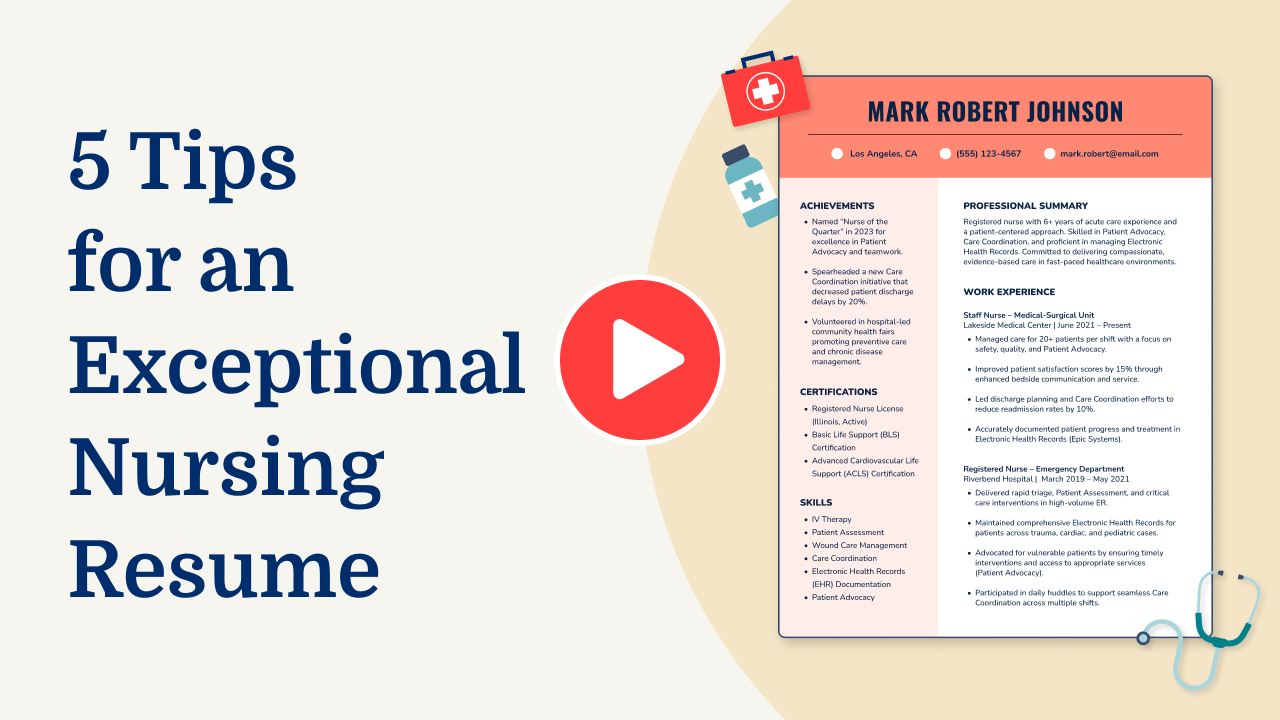
Write a strong professional summary
A professional summary on a resume serves as an introduction to hiring managers, allowing them to quickly grasp your qualifications. It typically includes a snapshot of your experience, skills, and achievements. When crafting a resume, decide between using a summary or an objective based on you career stage.
For experienced applicants, a professional summary is ideal because it showcases what you have accomplished in your career. In just three to four sentences, you can highlight your work history, skills, and key achievements to give employers insight into your professional identity and the value you bring.
Conversely, resume objectives focus on career goals and are best suited for entry-level nurses or those changing careers. They address “what I aim to contribute” rather than “what I’ve accomplished.”
Next, let’s go through examples tailored to various experience levels that illustrate both summaries and objectives effectively.
Oncology nurse resume summary examples
Entry-level
Recent nursing graduate with a Bachelor of Science in Nursing (BSN) and oncology nursing certification. Completed clinical rotations in oncology units, gaining foundational skills in patient care, chemotherapy administration, and symptom management. Certified in Basic Life Support (BLS) and passionate about providing compassionate care to cancer patients.
Mid-career
Oncology nurse with over five years of experience in outpatient and inpatient oncology settings. Proficient in administering chemotherapy, managing side effects, and educating patients and families on treatment plans. Known for strong clinical skills, empathy, and dedication to improving patient outcomes through evidence-based practices.
Experienced
Seasoned oncology nurse with 15+ years of experience specializing in hematology-oncology and palliative care. Leader in developing patient-centered care plans and managing complex cases. Holds advanced certifications including OCN (Oncology Certified Nurse) and ACLS (Advanced Cardiovascular Life Support). Recognized for exceptional leadership skills, mentoring new nurses, and contributing to continuous improvement initiatives within the oncology department.
Oncology nurse resume objective examples
Recent graduate
Compassionate and dedicated recent nursing graduate with a Bachelor of Science in Nursing seeking an entry-level oncology nurse position. Eager to apply foundational knowledge in patient care and develop specialized skills in oncology nursing within a supportive healthcare team.
Career changer
Motivated former medical assistant transitioning into the role of oncology nurse, bringing strong patient care experience and a passion for supporting cancer patients. Committed to learning and contributing effectively to a multidisciplinary team while delivering empathetic, high-quality care.
Specialized training
Registered Nurse with specialized training in chemotherapy administration eager to start a career as an oncology nurse. Passionate about using clinical skills and education to support cancer patients through treatment, focusing on improving their overall well-being and quality of life.
Using a AI Resume Builder can help you quickly create a polished oncology nurse resume with easy-to-use templates, so you can focus more on the content and less on the design.
Include relevant certifications and training
Certifications are important for an oncology nurse because they show you have the right skills and knowledge to give special care to cancer patients. They prove you know the latest methods and treatments in oncology.
Certifications also help employers trust that you can handle complex situations with confidence. By listing them, you highlight your expertise and dedication to quality patient care. Sought-after certifications in oncology nursing include:
- Oncology Certified Nurse (OCN)
- Advanced Oncology Certified Nurse Practitioner (AOCNP)
- Chemotherapy and Biotherapy Provider Card
- Certified Pediatric Hematology Oncology Nurse (CPHON)
- Chemotherapy Biotherapy Certification
Creating a certifications section on your resume makes it easy for potential employers to see your qualifications at a glance. These certifications show you’re ready for the challenges of working as an oncology nurse. They help set you apart from others by showing your commitment to professional growth.
Example of a certifications section
Oncology Certified Nurse (OCN)
Issued by: Oncology Nursing Certification Corporation (ONCC)
Basic Life Support (BLS) Certification
Issued by: American Heart Association
Advanced Cardiovascular Life Support (ACLS) Certification
Issued by: American Heart Association
Chemotherapy and Biotherapy Provider Card
Issued by: Oncology Nursing Society (ONS)
For nursing roles, choose a resume template with a simple, professional design rather than an overly decorative one. This approach ensures you present a polished image that can set you apart.
Showcase your work experience
When applying for an oncology nurse position, it’s important to highlight your work experience in a way that stands out to potential employers. Your work history must demonstrate how you’ve used your skills and knowledge in real-world settings.
By listing jobs in reverse-chronological order, you can clearly show career growth and the depth of your experience. For each role, include the job title, employer name, location, and employment dates. This format helps hiring managers quickly see where you’ve worked and what roles you’ve held.
Use action-oriented language to describe what you did in each job. Instead of just listing duties, focus on tasks where you made a difference. Whenever possible, include numbers or facts that illustrate the impact of your work—like improving patient care or reducing wait times for treatments. Highlight key responsibilities such as:
- Administering chemotherapy
- Managing patient records
- Educating patients about treatment plans
- Collaborating with a healthcare team
By clearly presenting this information, you make it easy for employers to see why you’re a good fit for their team. Showcasing relevant experience effectively can help set you apart from other applicants and increase your chances of landing the oncology nurse position you’re aiming for.
5 oncology nurse work history bullet point examples
- Administered chemotherapy treatments to over 50 patients weekly, ensuring accurate dosing and monitoring for adverse reactions.
- Collaborated with a multidisciplinary team to create individualized care plans, improving patient outcomes by 20%.
- Educated patients and families about treatment protocols, reducing anxiety levels by 30% through clear communication and support.
- Conducted regular assessments of patient progress, adjusting care plans as needed to achieve a 15% increase in recovery rates.
- Mentored new oncology nurses, improving team performance and achieving a higher standard of patient care.
Choosing a resume format that highlights specialized training, patient care experience, and teamwork can distinguish oncology nurses in their field.
Match your resume with the job description
Tailoring your resume to the job description is essential because it helps you stand out to employers and successfully pass through applicant tracking systems (ATS). An ATS-friendly resume is designed to align with the specific keywords and phrases ATS scans for, which are often drawn directly from job postings. By doing this, applicants ensure their information is noticed by both the system and hiring managers.
An effective ATS-friendly resume incorporates terms that reflect the skills required for the role. Including these keywords naturally in your content increases your chances of being recognized as a strong match for the position. This strategy ensures your application avoids being filtered out before reaching a recruiter.
To identify relevant keywords, analyze job descriptions for recurring skills, qualifications, or duties. For example, if you’re applying for an oncology nurse position, you might notice repeated mentions of “compassionate patient care,” “administering chemotherapy treatments,” or “healthcare team collaboration.”
When you customize your resume, integrating such language demonstrates your understanding of what the employer needs. Embed these terms seamlessly into your resume. Instead of writing “Provide high-quality patient care,” consider phrasing it as “Delivered high-quality patient care, improving overall patient well-being during treatments through specialized individual attention.”
This approach not only matches ATS criteria but also highlights how your experience aligns with the role. By tailoring resumes carefully, applicants can improve their ATS compatibility while boosting their potential to secure interviews and move forward in their careers.
Don’t let your resume get stuck in a computer system! Our ATS Resume Checker finds common mistakes and gives tips to make your resume better.
FAQ
Do I need to include a cover letter with my oncology nurse resume?
Including a well-written nursing cover letter with your resume is essential to stand out from other applicants and secure more interviews.
A cover letter allows you to personalize your application, sharing your specific interest in the position and facility, elaborating on relevant experience, and showcasing your patient care skills.
For instance, if the hospital has a unique program or specialty, you can elaborate on your interest or experience in those areas.
You can use our Cover Letter Generator to create a cover letter based on your resume or craft a brand-new one with step-by-step guidance and expert content suggestions.
We also recommend referencing our library of cover letter examples for additional samples tailored to various industries and career levels.
How long should a oncology nurse resume be?
For an oncology nurse, a one-page resume is often sufficient, especially if you’re early in your career or have limited experience. Focus on key skills like patient care, chemotherapy administration, and any relevant certifications.
However, if you have extensive experience or specialized training in areas like clinical trials or patient education, a two-page resume might be more appropriate.
Use the extra space to detail significant achievements or leadership roles that highlight your expertise. Ultimately, how long a resume should be depends on the depth of your experience and relevance to the role.
How do you write a oncology nurse resume with no experience?
Writing an oncology nurse resume with no experience can be challenging. Focus on highlighting your education, skills, and any hands-on training to create a compelling application despite the lack of professional experience.
- Emphasize your nursing education: Start with your degree in nursing, including the institution’s name, graduation date, and any honors. Include relevant coursework that pertains to oncology or patient care.
- Detail clinical rotations: Use your clinical rotation experiences as a way to showcase practical skills. Describe specific tasks you performed related to oncology or patient interaction, such as administering medications or providing emotional support to patients.
- Showcase certifications: List any relevant certifications like RN licensure and additional ones such as Chemotherapy/Biotherapy certification if applicable. These demonstrate commitment to the specialty.
- Highlight transferable skills: If you’ve worked in other healthcare roles or volunteered in medical settings, emphasize communication, teamwork, and problem-solving skills that are important for an oncology nurse.
Check out our resources on crafting a resume with no experience for more detailed guidance from career experts.
Rate this article
Oncology Nurse
Share this page
Additional Resources
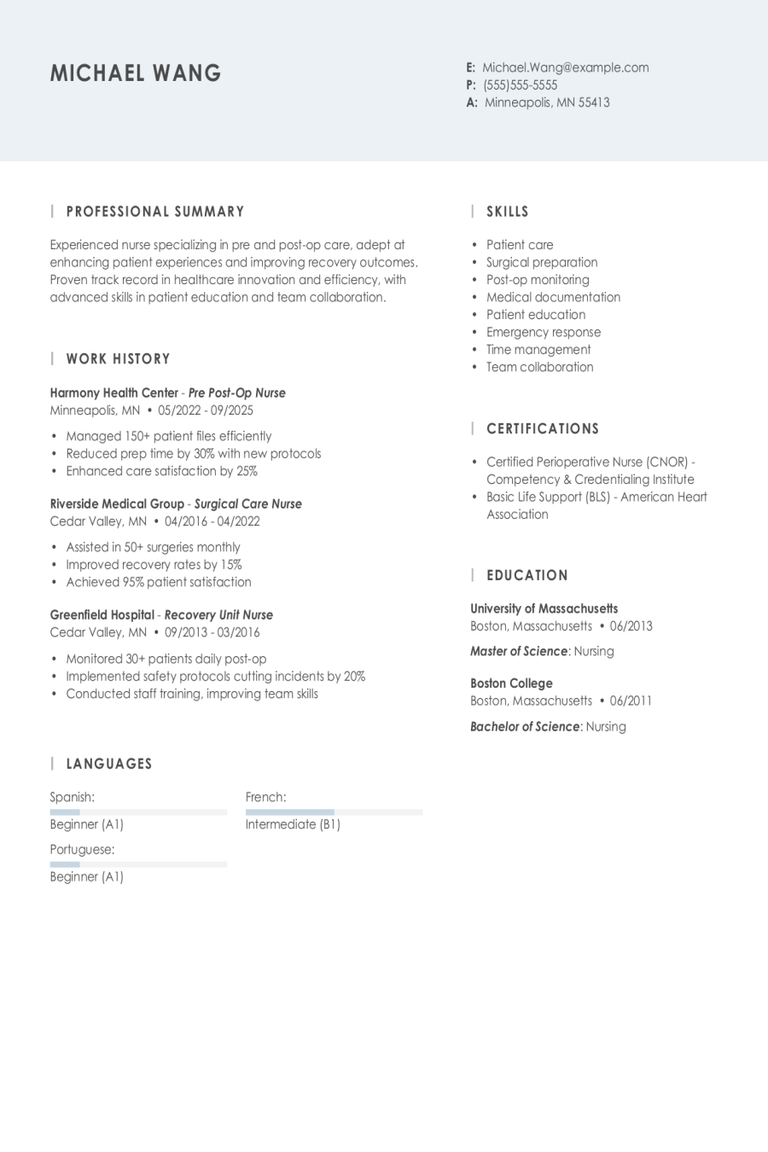
Pre Op/Post Op Nurse Resume Examples & Templates
These pre op/post op nurse resume examples show how to highlight your skills in patient care and surgical prep. Learn tips for showcasing your experience and making your qualifications stand
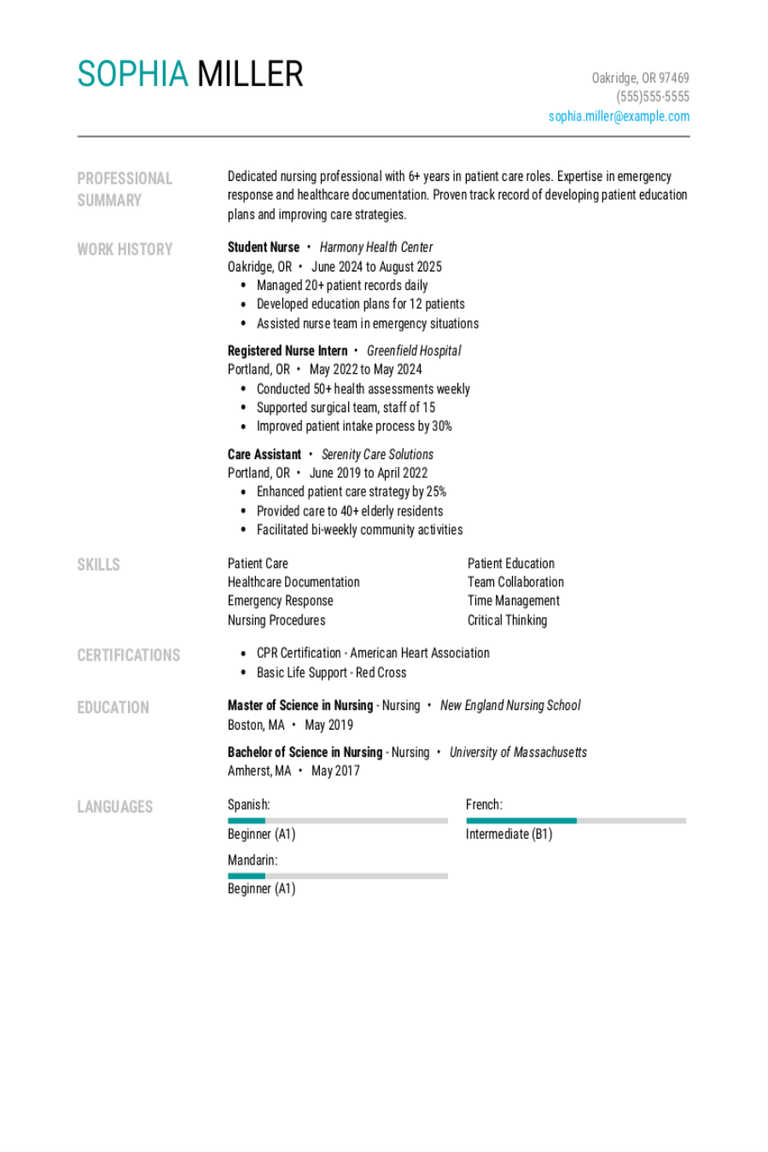
Student Nurse Resume Examples & Templates
Discover student nurse resume examples that show off patient care, teamwork, and time management. Learn how to present your skills and experiences to stand out in the healthcare field.Build my
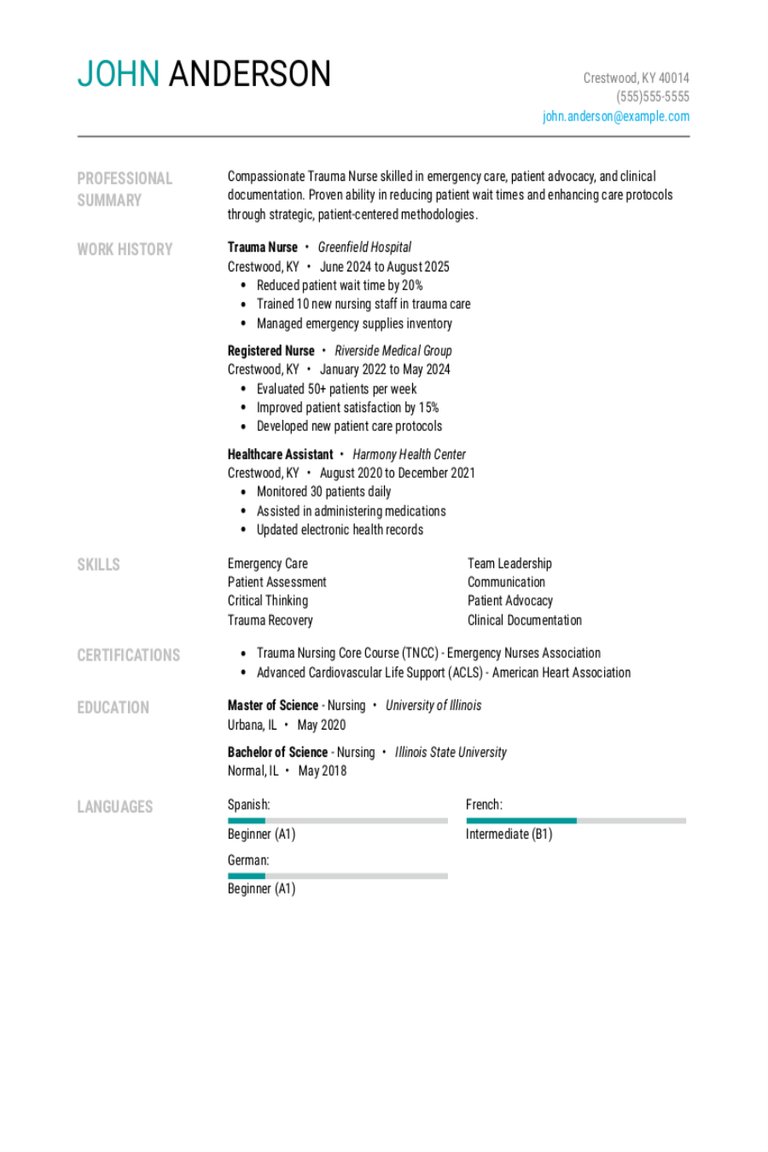
Trauma Nurse Resume Examples & Templates
Explore trauma nurse resume examples that showcase how to present your emergency care skills and experience clearly. Our tips will help you highlight your fast-paced decision-making and patient care abilities
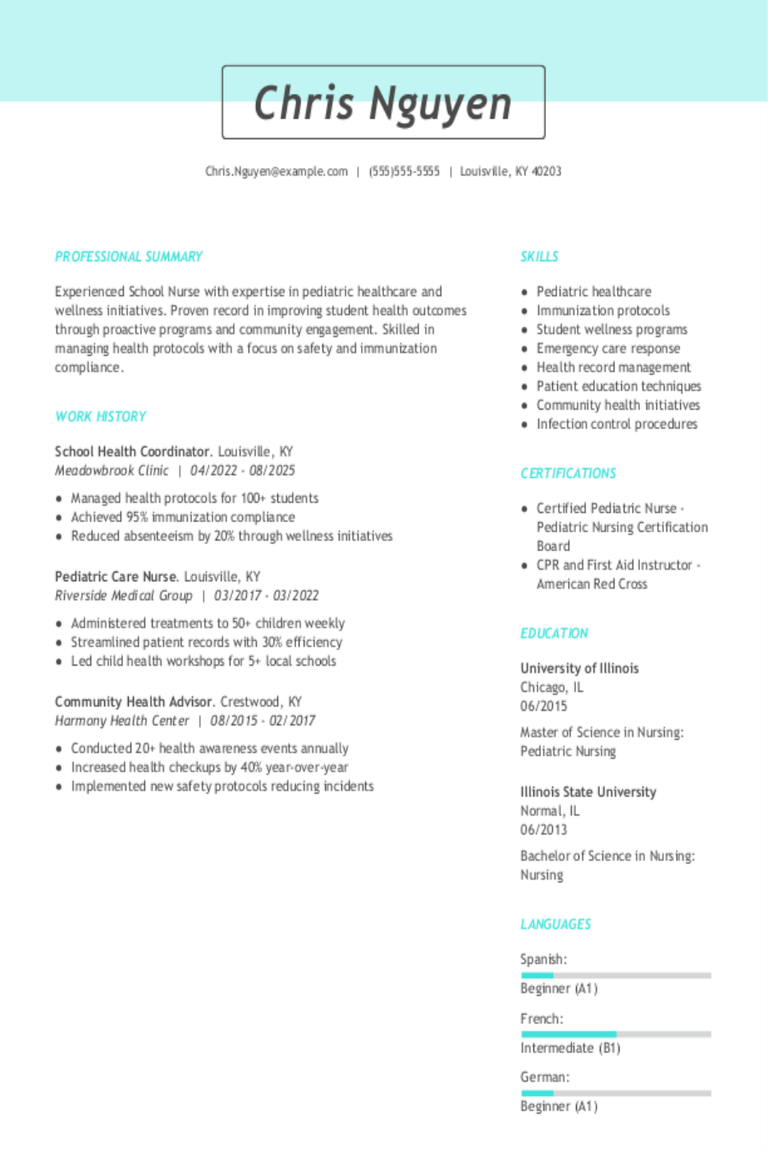
School Nurse Resume Examples & Templates
As a school nurse, your resume must show how you care for students, manage health records, and handle emergencies. Use our samples to see how to highlight your compassion and
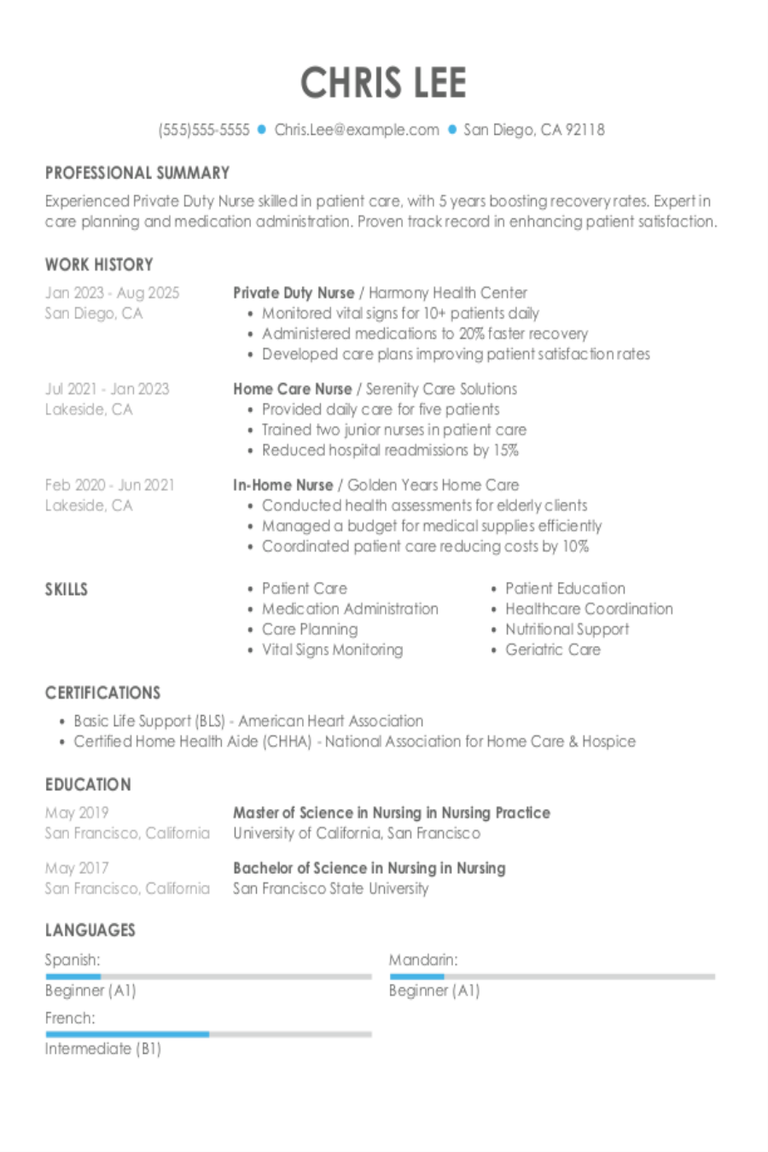
Private Duty Nurse Resume Examples & Templates
As a private duty nurse, your resume should focus on personalized care, patient advocacy, and strong communication skills. Learn how to highlight your ability to provide one-on-one support and manage
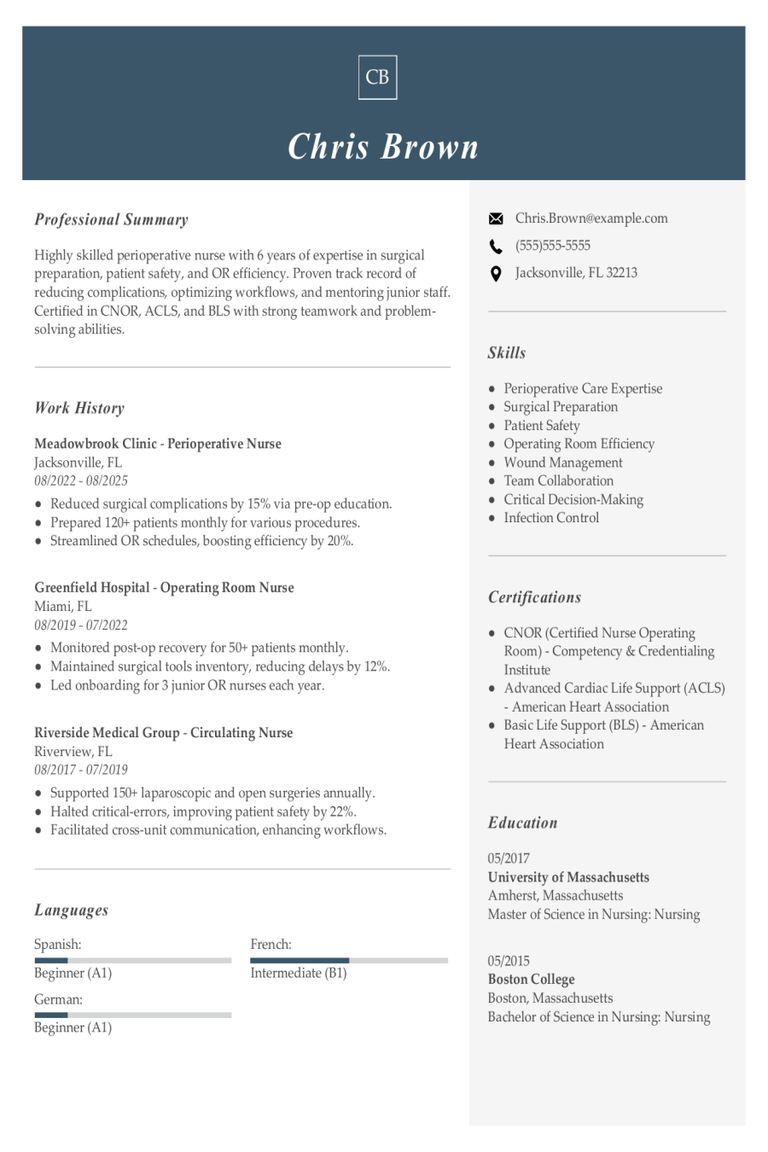
Perioperative Nurse Resume Examples & Templates
Explore perioperative nurse resumes that emphasize patient care, teamwork, and surgical support. Learn how to showcase your skills and experience to impress hiring teams in the healthcare field.Build my resumeImport
